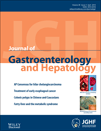Des-gamma-carboxy prothrombin identified by P-11 and P-16 antibodies reflects prognosis for patients with hepatocellular carcinoma
Abstract
Background and Aims
Serum des-γ-carboxy prothrombin (DCP) is an established tumor marker in patients with hepatocellular carcinoma (HCC), which can be identified by using MU-3 antibody. The MU-3 antibody mainly reacts with the 9–10 glutamic acid residues of DCP (conventional DCP). Since other variants of DCP with fewer glutamic acid residues can be detected using P-11 and P-16 antibodies (code name: NX-PVKA), we examined the clinical characteristics associated with NX-PVKA, and whether NX-PVKA is a useful measure in HCC patients.
Methods
Participants comprised 197 HCC patients admitted to our hospital between 2001 and 2010. NX-PVKA, conventional DCP, alpha-fetoprotein, and L3 fraction of alpha-fetoprotein were measured prior to initiation of HCC treatment.
Results
Of the tumor markers assessed, NX-PVKA was the only significant predictor of prognosis (hazard ratio, 81.32; P < 0.0001). Patients with NX-PVKA level ≥ 100 mAU/mL showed significantly lower survival rates (P < 0.0001). NX-PVKA level was also significantly associated with platelet count, prothrombin time, C-reactive protein, sex, maximum tumor size, number of nodules, and portal venous invasion by HCC. Finally, using NX-PVKA level and other clinical parameters, we established a prognostic model to estimate patient survival time.
Conclusions
NX-PVKA offers the best marker of tumor prognosis among HCC patients, and is strongly associated with tumor factors and hepatic functional reserve. NX-PVKA could be useful for clinical evaluation of tumor severity, as well as the estimated duration of survival among patients with HCC.




